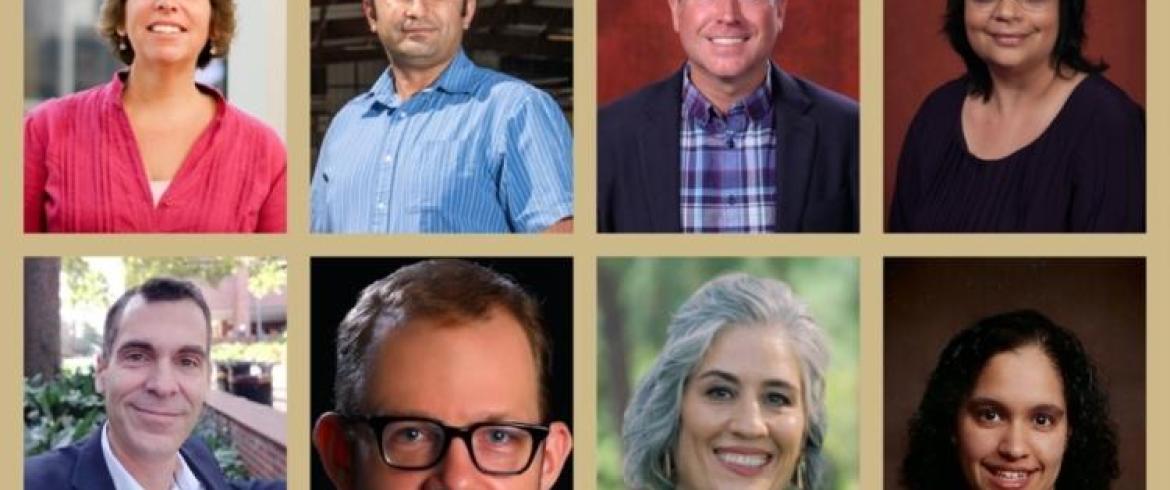
Clockwise from top left: Marcia A. Mardis, Eren Erman Ozguven, Scott M. Pickett, Jessica De Leon, Faye R. Jones, Ellen Piekalkiewicz, John Mathias and Mark Horner.
The increasing frequency of natural catastrophes and their uneven impact on vulnerable populations calls for the development of disaster Resiliency Hubs. Now, through a grant from the National Science Foundation (NSF), a multidisciplinary team of Florida State University researchers is looking to utilize a commonly under-recognized space in disaster response: public libraries.
Focusing on Calhoun County, Florida, a region that remains devastated by 2018’s Hurricane Michael, the researchers will collaborate with public librarians and community members to establish a transferable design and assessment process that will enable rural public libraries to be Resiliency Hubs.
Resiliency Hubs are community-serving facilities tailored to support residents, coordinate communication, distribute resources and provide technical assistance while enhancing the quality of life. They offer an opportunity to effectively work at the nexus of community resilience, emergency management, climate change mitigation and social equivalence while also providing opportunities for communities to become more self-determining, socially connected, and successful before, during and after disruptions.
Marcia A. Mardis, professor and associate dean for research in the College of Communication and Information, will lead the project as principal investigator. The interdisciplinary project also includes researchers from the FAMU-FSU College of Engineering, and colleges of Medicine, Social Sciences and Public Policy, and Social Work.
“We’re bringing together multiple disciplines and engaging multiple stakeholders, including citizens, to forge deep collaborative relationships that help us and our community partners better understand the key elements of disaster resilience,” Mardis said. “This project might not be long in duration, but it is sizable in opportunity and reach.”

The researchers will inclusively design tailored rural Resiliency Hubs in all five districts of Calhoun County and identify opportunities to expand and strengthen community collaborations.
“Our public librarians support Calhoun’s citizens in good times and bad,” said Rita Maupin, director of the Calhoun County Public Library System. “We are so pleased to continue our relationship with FSU so that our support best meets the community’s needs.”
The project is part of Stage 2 of the Civic Innovation Challenge, a multi-agency, federal government research and action competition that aims to fund ready-to-implement, research-based pilot projects that have the potential for scalable, sustainable and transferable impact on community-identified priorities.
“Rural Resiliency Hubs: An Integrated, Community-Centered Approach to Addressing the Resiliency Divide through Rural Public Libraries'' was one of 52 projects and the only one in Florida awarded planning grants in Stage 1 and is one of 17 projects selected for Stage 2. The FSU project was awarded $581,226 over 12 months in Stage 2.
The findings from this project will help to improve understanding of emergency response operations and contribute to the development of new disaster-related policies and plans for public libraries throughout the United States. The Florida Institute of Government will collaborate with the research team and civic stakeholders to disseminate research findings and recommendations to all 67 Florida counties and other localities to address the resiliency divide rural citizens often experience during and in the aftermath of disasters.
The FSU research team also includes Associate Professor Eren Erman Ozguven of the FAMU-FSU College of Engineering and director of Resilient Infrastructure and Disaster Response (RIDER) Center; Associate Professor Scott M. Pickett and Assistant Professor Jessica De Leon of the College of Medicine; Professor Mark Horner, Department of Geography chair in the College of Social Sciences and Public Policy; Assistant Professor John Mathias, and Ellen Piekalkiewicz, director of the Center for the Study and Promotion of Communities, Families, and Children, both from the College of Social Work; and Senior Research Associate Faye R. Jones from the College of Communication and Information.
Jeff Hendry of the John Scott Dailey Florida Institute of Government at FSU is leading project evaluation. The researchers have also partnered with Cellint Traffic Solutions to provide locations and movements of people evacuating and sheltering in Calhoun County and surrounding counties during hurricanes.
To learn more about the project, visit nsf.gov. For more information about the NSF Civic Innovation Challenge, visit nsfcivicinnovation.org.
RELATED ARTICLES
Civil and environmental engineering professor is favorite media source for storm evacuation
A storm plan: New research creates model to help plan for special needs, pet-friendly shelters
